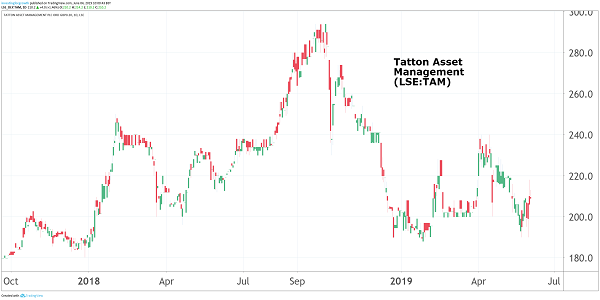Stockwatch: Growth at a fair price
Results are strong and the company offers further upside from regulatory needs, argues our analyst.
4th June 2019 11:38
by Edmond Jackson from interactive investor
Results are strong and the company offers further upside from regulatory needs, argues our analyst.

At the end of 2018 I noted how smaller UK financial stocks were hit especially hard by autumn's market rout, but that, while hot air needed to escape from exotic ratings, there was broadly scope for recovery.
Among examples I favour, AIM-listed pawnbroker H&T Group (LSE:HAT) is up 33% to 320p while AIM-listed small cap fund manager Miton Group (LSE:MGR) rebounded 30% from 47p to 61p. Admittedly, the latter, remains substantially a play on equities, has eased to 51p as market jitters return.
Somewhere in between these two is AIM-listed Tatton Asset Management (LSE:TAM) which dials into the expansion of Independent Financial Adviser (IFA) firms, assisting them not only with investments but also regulatory needs and even mortgage services.
Significantly geared to funds investment
Despite US equities fretting over China/Mexico trade and Brexit fog continuing for who knows how long, Tatton's management asserts a growth narrative helped by regulatory demands on IFA firms – such as to regularly report all costs and demonstrate value added for their clients.
Latest full-year results to end-March show pre-tax profit after exceptionals and share-based payments up 69.4% to £6.1 million on revenue up 12.9% to £17.5 million – that's a 33.8% operating margin. Assets under management soared 24.5% to £6.1 billion.
Investments are the chief £4.6 million contributor to operating profit, while mortgages accounted for £1.6 million and consulting is down from £3.8 million to £3 million, as both revenue and margin slipped despite a 6% rise in IFA clients to 390.
Tatton's finance director puts this down to "average revenue pressured by lower levels of additional consultancy and reduced flows on a wrap platform."

Source: TradingView Past performance is not a guide to future performance
To an extent, Tatton benefits from the structure of the IFA industry – lots of smaller firms - making it vital to outsource investment management. However, I also feel that, quite like with Miton, a growth profile rests too on British people's willingness to continue investing. More likely they will, given the culture is to take more personal initiative nowadays, though if Brexit leads to serious economic harm, then demand for funds could stall a while.
Basic earnings per share (EPS) more than doubled to 8.7p, although adjusted, fully-diluted EPS rose 9.9% to 10p. That's some differential for considering what an appropriate price/earnings (PE) ratio might be. Note 9 to the accounts puts the difference down to £0.9 million share-based payments and £0.5 million exceptional costs of new fund/project set-up. It's fair to use like-for-like underlying performance, but these are still genuine costs.
With the stock currently at 210p, the historic PE is in the low 20's but could easily drop to the high teens as progress continues. That's a fair growth rating. Return on capital employed (ROCE) continues at around 48%, reflecting an ability to generate strong returns on low capital needs.
| Tatton Asset Management - financial summary | |||||
|---|---|---|---|---|---|
| year ended 31 Mar | 2015 | 2016 | 2017 | 2018 | 2019 |
| Turnover (£ million) | 8.5 | 9.2 | 11.9 | 15.5 | 17.5 |
| IFRS3 pre-tax profit (£m) | 2.0 | 3.6 | 6.1 | ||
| Operating margin (%) | 23.1 | 33.8 | |||
| IFRS3 earnings/share (p) | 3.9 | 7.9 | |||
| Normalised earnings/share (p) | 6.5 | 9.1 | 10.0 | ||
| Earnings per share growth (%) | 40.0 | 9.9 | |||
| Price/earnings multiple (x) | 23.1 | 21.0 | |||
| Historic annual average P/E (x) | 53.0 | 43.0 | 26.0 | ||
| Cash flow/share (p) | 4.1 | 6.1 | 11.3 | 3.9 | |
| Dividend per share (p) | 6.6 | 8.4 | |||
| Dividend yield (%) | 3.1 | 4.0 | |||
| Covered by earnings (x) | 1.4 | 1.2 | |||
| Net tangible assets per share (p) | 15.6 | 18.2 | |||
| Source: Company REFS |
Results further sweetened by new contracts
An initial three-year contract has been declared with Ascencia Investment Management to run their discretionary portfolios, similarly Tenet Group which is one of the UK's largest financial adviser.
Tatton's chief executive says: "IFA firms of all sizes are recognising the benefits of outsourcing their investment management because of the difficulties in researching and maintaining investment portfolios themselves." And the chief investment officer adds: "Our managed portfolio service offers very competitive charges without any reduction in standards are highly scalable... low cost and risk-managed long-term returns are a highly compelling combination..."
So, despite my concern about Brexit potentially weighing on British investor sentiment, if Tatton can continue rolling out its services to meet IFA needs, then with revenue as yet sub-£20 million there's scope to deliver attractive returns say on a 3-to-5-year view. Tatton was founded in 2012 and is embarking on its third year of an AIM listing, whereas a purer fund management stock is possibly late-cycle after a decade of economic expansion and monetary stimulus.
Supported also by a near-5% dividend yield
Tatton's high rate of conversion of operating profit to cash means it can sustain what may seem like a tight earnings cover of 1.2 times. From another angle, the board has declared a targeted payout ratio of 70% of annual adjusted earnings per share over the medium term.
The cash flow statement shows net cash from operations (i.e. post tax and exceptional costs) up 165% to £6.1 million, then just £0.6 million spent on investment. At the end of March, the balance sheet had cash up 19.7% to £12.2 million. There's no debt, with liabilities constituting just trade payables and tax, hence a 27.3% rise in the ordinary dividend to 8.4p is amply possible – at a cost of £4.7 million.
I'd be surprised if a 10p, or better, dividend isn't achieved within the next two years unless a recession slams UK financial services. So, with the stock at around 210p, a prospective yield around 4.75% and growing. Management says that with balance sheet cash rising, it is also alert for acquisitions, though with strict criteria has declined some.
When Tatton floated at 156p two years ago, one of its three "chief investment officers" actually bought 65,614 shares in the placing to own 463,419 overall. The stock broadly rose to 294p by late last summer, but there wasn't any director selling. During the market rout, he price twice tested 190p last December and January, then in March a director bought 24,500 shares at 202p and 25,000 shares at 203p later that month.
"Growth at fair price"
Now, the PE is no longer stretched near to 30 times like it was last summer. The yield is meaningful and the business model financially attractive. The chief uncertainties are whether any UK slowdown can dampen demand for Tatton's services, although a fragmented IFA industry plays to its advantage.
Management proclaims: "a simple lean operating model that gives the IFA and their clients the best investment management products at a sector leading price point" and on a multi-year view there looks decent mileage ahead. Liberation of pensions and more self-employed people has spawned an extensive industry of smaller advice firms, requiring their own support services.
The context can thus appear quite a "double-edged sword" with near-term risks – sentiment surrounding financial stocks and the economic effects of Brexit – albeit offering a promising medium-term scenario.
A relatively tight market in the shares of this £117 million company could contribute to volatility. Yet Tatton's progress and prospects make it worth averaging into its stock. Accumulate.
Edmond Jackson is a freelance contributor and not a direct employee of interactive investor.
These articles are provided for information purposes only. Occasionally, an opinion about whether to buy or sell a specific investment may be provided by third parties. The content is not intended to be a personal recommendation to buy or sell any financial instrument or product, or to adopt any investment strategy as it is not provided based on an assessment of your investing knowledge and experience, your financial situation or your investment objectives. The value of your investments, and the income derived from them, may go down as well as up. You may not get back all the money that you invest. The investments referred to in this article may not be suitable for all investors, and if in doubt, an investor should seek advice from a qualified investment adviser.
Full performance can be found on the company or index summary page on the interactive investor website. Simply click on the company's or index name highlighted in the article.
Disclosure
We use a combination of fundamental and technical analysis in forming our view as to the valuation and prospects of an investment. Where relevant we have set out those particular matters we think are important in the above article, but further detail can be found here.
Please note that our article on this investment should not be considered to be a regular publication.
Details of all recommendations issued by ii during the previous 12-month period can be found here.
ii adheres to a strict code of conduct. Contributors may hold shares or have other interests in companies included in these portfolios, which could create a conflict of interests. Contributors intending to write about any financial instruments in which they have an interest are required to disclose such interest to ii and in the article itself. ii will at all times consider whether such interest impairs the objectivity of the recommendation.
In addition, individuals involved in the production of investment articles are subject to a personal account dealing restriction, which prevents them from placing a transaction in the specified instrument(s) for a period before and for five working days after such publication. This is to avoid personal interests conflicting with the interests of the recipients of those investment articles.